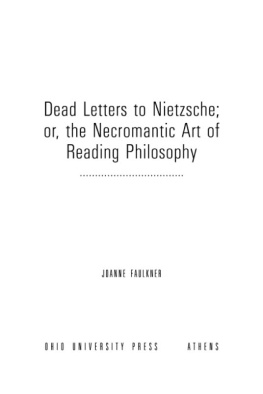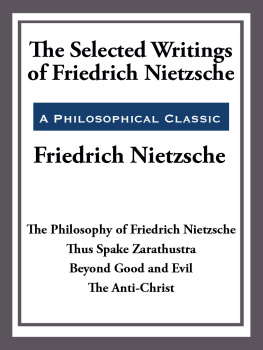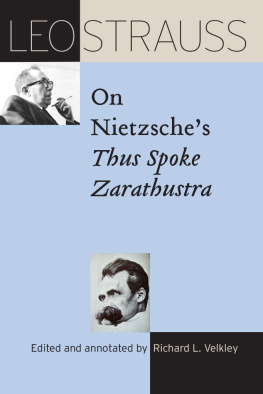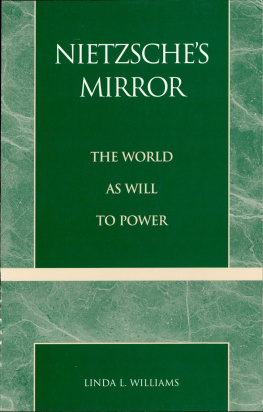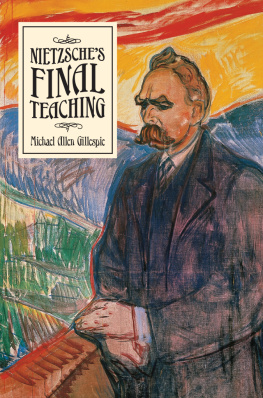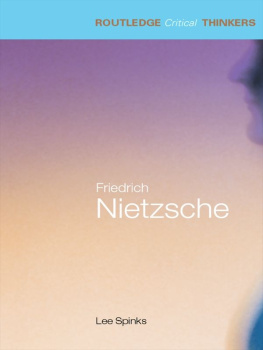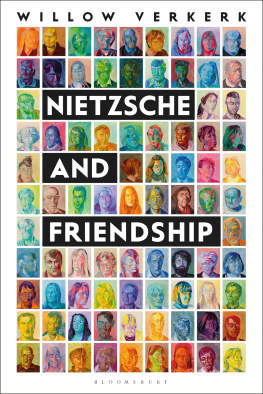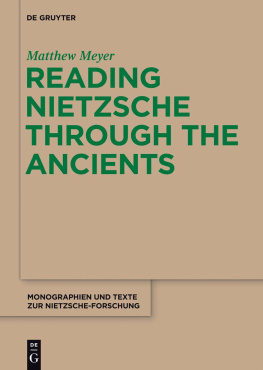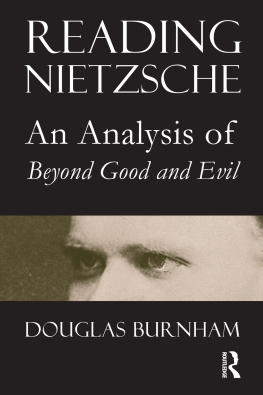Contents
Page List
Series in Continental Thought
Editorial Board
Ted Toadvine, Chairman, University of Oregon
Elizabeth A. Behnke, Study Project in Phenomenology of the Body
David Carr, Emory University
James Dodd, New School University
Lester Embree, Florida Atlantic University
Jos Huertas-Jourda, Wilfrid Laurier University
Joseph J. Kockelmans, Pennsylvania State University
William R. McKenna, Miami University
Algis Mickunas, Ohio University
J. N. Mohanty, Temple University
Dermot Moran, University College Dublin
Thomas Nenon, University of Memphis
Rosemary Rizo-Patron de Lerner, Pontificia Universidad Catlica del Per, Lima
Thomas M. Seebohm, Johannes Gutenberg Universitt, Mainz
Gail Soffer, Rome, Italy
Elizabeth Strker, Universitt Kln
Nicolas de Warren, Wellesley College
Richard M. Zaner, Vanderbilt University
International Advisory Board
Suzanne Bachelard, Universit de Paris
Rudolf Boehm, Rijksuniversiteit Gent
Albert Borgmann, University of Montana
Amedeo Giorgi, Saybrook Institute
Richard Grathoff, Universitt Bielefeld
Samuel Ijsseling, Husserl-Archief te Leuven
Alphonso Lingis, Pennsylvania State University
Werner Marx, Albert-Ludwigs Universitt, Freiburg
David Rasmussen, Boston College
John Sallis, Boston College
John Scanlon, Duquesne University
Hugh J. Silverman, State University of New York, Stony Brook
Carlo Sini, Universit di Milano
Jacques Taminiaux, Louvain-la-Neuve
D. Lawrence Wieder
Dallas Willard, University of Southern California
Ohio University Press, Athens, Ohio 45701
www.ohioswallow.com
2010 by Ohio University Press
All rights reserved
To obtain permission to quote, reprint, or otherwise reproduce or distribute material from Ohio University Press publications, please contact our rights and permissions department at (740) 593-1154 or (740) 593-4536 (fax).
Printed in the United States of America
Ohio University Press books are printed on acid-free paper
17 16 15 14 13 12 11 10 5 4 3 2 1
Library of Congress Cataloging-in-Publication Data
Faulkner, Joanne.
Dead letters to Nietzsche, or, The necromantic art of reading philosophy / Joanne Faulkner.
p. cm. (Series in continental thought ; 38)
Earlier versions of some of the material in this book have been published in the form of articlesAcknowledgments.
Includes bibliographical references and index.
ISBN 978-0-8214-1913-7 (hc : alk. paper) ISBN 978-0-8214-4329-3 (electronic)
1. Nietzsche, Friedrich Wilhelm, 1844-1900. 2. Subjectivity. I. Title. II. Title: Dead letters to Nietzsche. III. Title: Necromantic art of reading philosophy.
B3317.F337 2010
193dc22
2009053611
CONTENTS
...................................
ACKNOWLEDGMENTS
...................................
Earlier versions of some of the material in this book have been published in the form of articles, and I gratefully acknowledge the assistance I received from the journal editors and anonymous readers who contributed to the improvement of this work, through their advice and commentary. The articles in question are: Keeping It in the Family: Sarah Kofman Reading Nietzsche as a Jewish Woman, Hypatia: A Journal of Feminist Philosophy 23[1] (JanuaryMarch 2008): 4164; The Vision, the Riddle, and the Vicious Circle: Pierre Klossowski Reading Nietzsches Sick Body through Sades Perversion, Textual Practice 21[1] (March 2007): 4369 (at www.informaworld.com); The Body as Text in the Writings of Nietzsche and Freud, Minerva 7 (November 2003): 94124.
I would also like to acknowledge the Institute for Advanced Study at La Trobe University, Melbourne, for their Postgraduate Writing-up Award, which I received in 2006 to support the development of my book proposal; and the Killam Trust for awarding me the Izaak Walton Killam Postdoctoral Fellowship at the University of Alberta, which supported the writing up of the manuscript.
I wish to extend my heartfelt gratitude to my doctoral supervisor, Philipa Rothfield, whose thoughtful engagement with my ideas, pastoral support, rigorous interrogations, and continuing friendship have sustained this project. I am indebted to George Vassilocopoulos for reading and commenting on an early draft of the entire manuscript, and Matthew Sharpe and Ashley Woodward for their valuable feedback on drafts of chapters. Thanks also to David McNeill for allowing me to access some of his unpublished writing, and for provoking a revision of my thinking about the relation between master and slave morality in Nietzsches work; and to Daniel Smith, for providing me with an advance copy of his Diacritics article, and prior to that with speaking notes for a paper he delivered in Sydney in 1998, which were invaluable to me while working through Klossowskis somatic vocabulary. Thank you to the postgraduate community in Philosophy and Gender, Sexuality and Diversity Studies, at La Trobe University, to whom versions of chapters were presented as papers for their colloquia. I am also grateful to Daniel Conway, Rosalyn Diprose, and David Pettigrew for their generous support of this work in doctoral-thesis form, as its examiners, and later as mentors.
Finally, I would like to thank my husband, best friend, and tireless reader and supporter of my work, Peter Chen, without whose love, forbearance, and dependable parenting to our children, this book would not have seen its way to completion.
INTRODUCTION
...................................
The Quickened and the Dead
Are our most violent poltergeists
Books?
gnashing their shelves
smashing things in the dark
they leave a greenish tombish
smell on our reading fingers
they make us musty
and bereft.
Dorothy Porter
More than most philosophers, Friedrich Wilhelm Nietzsche commands a following of readers who attempt, each in his or her own manner, to perpetuate his legacy. Many of these thinkers have dedicated a great deal of their lives not only to reading and interpreting Nietzsches texts, but also attempting to actualize the event his writings only envisage: the revaluation of values, wherein philosophers forge their truths from strength, rather than in the spirit of life-negation. Nietzsches writings are attractive to contemporary philosophers for a number of reasons, each of which reflects a different interpretation of what it is to be a contemporary philosopher; or more specifically, a philosopher of Nietzsches future. Nietzsche is readily appropriated by conservative philosophers, who identify the leveling of culture with the attempt to improve access to education for women, ethnic minorities, and those who are otherwise systematically disadvantaged.which clearly resonates with an intolerance for the ideal of equality for all that many contemporary academics, indeed, many Nietzscheans, would laud.
Nietzsches perspectivism attracts a different constituency of less-conservative readers, attempting to make room for a polyvalent conception of truth in the wake of the collapse of a singular (biblical) authority through which knowledge is grounded. Indeed, in the light of his truth perspectivism, Nietzsche is often remembered as the grandfather of postmodernism by both foes and advocates of this new creed. Thinkers of the Left (most notably the French philosophers Jacques Derrida, Gilles Deleuze, and Michel Foucault) have been assiduous scholars of Nietzsche, drawing from his critique of the metaphysics of presencethis in spite (or perhaps because) of the fact that Nietzsche roundly criticized Socialism, anarchism, and democracy, in favor of a new cosmopolitan politics. Surprisingly, for many acquainted with Nietzsche, in recent years some feminists have also utilized his critique of Liberalism in order to promote a Feminism of difference,

